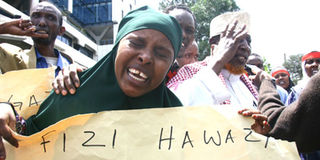Shifta war ‘marked the start of brutal killings’

PHOTO | BILLY MUTAI | FILE A member of Wagalla Massacre Foundation protests against reinstatement of Mr Bethuel Kiplagat as chairman of TJRC at NHIF building in Nairobi on February 27, 2012.
What you need to know:
- Residents say operation caused poverty in Northern Kenya
The Shifta War marked the beginning of systematic and widespread violation of human rights including mass killings in Northern Kenya, a new report on historical injustices reveals.
The report released by the Truth, Justice and Reconciliation Commission (TJRC) says officially 2,000 people were killed during the Shifta War waged between 1964 to 1967. However, the report notes that unofficial estimates place the death toll at 7,000.
“The Shifta War acts as a bridge from the violations committed by the colonial power prior to independence and the violations committed by the newly independent government,” the commission says.
The TJRC report says the war arose out of a long history of political unrest in Northern Kenya where ethnic groups resisted centralised colonial rule. Residents trace their low development levels to the war, the report adds.
It says after independence, security agents alongside military personnel were deployed in what was called the Northern Frontier District to quell the continuing resistance.
The commission says witness testimonies brought to the surface the long history of violation of human rights and related activities in Northern Kenya.
It adds that from the colonial days, Northern Kenya had been administered differently from the rest of the country and travel and movement restrictions were imposed and administrators were given extraordinary powers to arrest and detain members of what the State referred to as “hostile tribes”.
The truth team did not get much information about the war because of the secrecy surrounding military operations and the government’s reluctance to provide the information.
However, individuals and communities affected by the war submitted memoranda and information to the commission which enabled it to set out the broad characteristics of the war.
“Mass killings featured prominently in the witness testimonies and narratives. Pastoralist communities lost almost 90 per cent of their livestock through heavy handed strategies ,” the report says.
It says many residents of the region trace the high levels of poverty experienced by communities of Northern Kenya to the excesses of the Shifta War. “Women narrated horrible stories of rape and other forms of sexual violence by security forces,” the report says.
Most security operations entailed the following atrocities: Torture and ill-treatment, rape and sexual violence, looting of property and burning of houses. Residents who fled to Somalia only returned in 2000.




